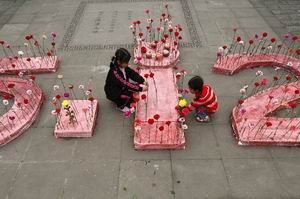|
【英文原文】
A Year Later, China's Quake Survivors Struggle
摘要:这场里氏7.9级的地震令近7万人丧生,逾1.7万人失踪,周二是大地震一周年纪念日,随着这个日子的临近,四川省遭受震灾最严重地区的人们正极力恢复原有的生活,重建被毁的家园。
The massive earthquake that struck southwestern China in May 2008 killed Wang Cheng's 12-year-old son, destroyed his house, wrecked the market where he worked as a butcher, and left him nearly paralyzed with grief.
Now, a year later, Mr. Wang says, he is back on his feet. He has cobbled together a house with wood he scavenged from destroyed buildings and a tarp he bought with government aid money. He supports his family by selling pork in a makeshift settlement of quake survivors here.
'I have to take care of my mother and my daughter,' says Mr. Wang. 'It's difficult. But what else can I do?'
As Tuesday's first anniversary nears of the 7.9-magnitude quake, which killed almost 70,000 people and left more than 17,000 others missing, people in the hardest-hit areas of Sichuan province are struggling to piece together their lives and rebuild devastated communities.
Many still live in temporary housing -- often metal-clad dwellings originally designed for migrant workers on construction sites -- as the government tries to speed the building of permanent homes and replace destroyed schools, hospitals and other infrastructure.
The government estimates the massive rebuilding effort will cost 1.7 trillion yuan, or about $250 billion. By the start of May, more than one million rural homes had been rebuilt in Sichuan
In Xiang'e, northwest of Chengdu, the provincial capital, clusters of new four-story row houses with spacious balconies are nearing completion. A sprawling middle school is being built to replace the one that collapsed in the quake, killing more than 300 students, according to local parents. Roads across the quake-hit area are clogged with cement mixers, dump trucks and excavating equipment.
All the spending on roads, bridges, public buildings and other projects is driving economic growth. Chengdu's gross domestic product was up 12.3% in the first quarter, compared with the year before, more than twice the growth rate for the country as a whole.
'The pace of rebuilding in China is certainly faster than in other natural-disaster zones that I've worked,' said Yin Yin Nwe, the chair of the United Nations disaster-management team for the quake and the head of Unicef's China operations.
She attributed the speed to the 'strong coordinating role' played by China's government and its ability to mobilize resources from across the country. The central government, for instance, has assigned wealthier eastern Chinese cities and provinces to assist in the reconstruction of quake-hit communities. 【已有很多网友发表了看法,点击参与讨论】【对英语不懂,点击提问】【英语论坛】【返回首页】
|